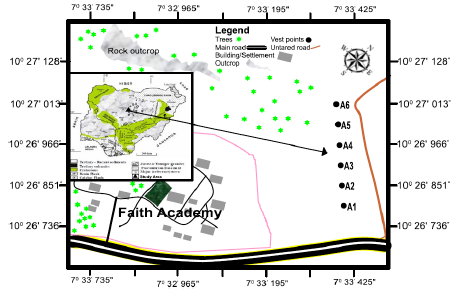The Delineation of Groundwater and Geotechnical Parameters within Marmara Area of Chikun Local Government of Kaduna State, Nigeria
Keywords:
Geotechnical, Resistivity, Chikun, Topsoil/Laterite, AquiferAbstract
Geophysical investigation for engineering studies was carried out around Faith Academy, Marmara village, Kaduna within the basement complex of North-Western Nigeria. Six Vertical Electrical Sounding (VES) were established using Schlumberger configuration. The geoelectric section revealed five subsurface layers defined by the topsoil, which comprises humus, clay and laterite; followed by weathered layer which comprises of sandy soil, fractured layer which constitutes of coarse grain sands and gravels and fresh basement which is porphyritic granite. The resistivities and thicknesses of the topsoil range from 47 - 4212 ?m and 2 - 5 m respectively. The weathered/fractured basement has average thickness of 42 m with resistivity ranging from 350 - 774 ?m. The Areas found to meet the conditions of high basement resistivity and shallow depth to basement, are found to be at VES A1, A2, A3, A4 and A6. Hence, VES A1 have been found to be the competent zones within the study area, and are good for the construction of high-rise buildings, roads and bridges. VES A3, A4 and A6 are areas that do not meet the conditions for construction of a high-rise buildings. However, VES A3, A4 and A6 appears to be viable for groundwater exploration with aquifer thickness ranges between 18 - 42 m and depth ranges of 6 - 10 m, while the average depth to fresh basement is 43 m.

Published
How to Cite
Issue
Section
Copyright (c) 2019 Journal of the Nigerian Society of Physical Sciences

This work is licensed under a Creative Commons Attribution 4.0 International License.
How to Cite
Similar Articles
- A. S. Akingboye, Geohydraulic characteristics and groundwater vulnerability assessment of tropically weathered and fractured gneissic aquifers using combined georesistivity and geostatistical methods , Journal of the Nigerian Society of Physical Sciences: Volume 4, Issue 4, November 2022
- N. K. Olasunkanmi, D. T. Ogundele, V. T. Olayemi, W. A. Yahya, A. R. Olasunkanmi, Z. O. Yusuf, S. A. Aderoju, Assessing leachate contamination and groundwater vulnerability in urban dumpsites: a case study of the Ipata Area, Ilorin, Nigeria , Journal of the Nigerian Society of Physical Sciences: Volume 6, Issue 2, May 2024
- A. Olajide, S. Bayode, T. Fagbemigun, A. Oyebamiji, J. Amosun, A. Owasanoye, Evaluation of Aquifer Protective Capacity and Groundwater Potential in Part of Iju, Akure-North, Ondo State, Nigeria , Journal of the Nigerian Society of Physical Sciences: Volume 2, Issue 3, August 2020
- Ogheneovo Akpoyibo, Ezekiel Onoriode Abriku, F. C. Ugbe, Ochuko Anomohanran, Geophysical and geotechnical assessment of Obiaruku-Agbor road failure in Western Niger-Delta, Nigeria , Journal of the Nigerian Society of Physical Sciences: Volume 7, Issue 1, February 2025
- J. O. Coker, H. H. Akpan, A. O. Atilade, O. F. Ojo, Seasonal Comparison of Potential Groundwater Aquifer in Ijebu-Ife, South-West, Nigeria, using Dipole-Dipole Array and Electromagnetic Methods , Journal of the Nigerian Society of Physical Sciences: Volume 2, Issue 4, November 2020
- Henry Ekene Ohaegbuchu, F. C. Anyadiegwu, P. O. Odoh, F. C. Orji, Review of top notch electrode arrays for geoelectrical resistivity surveys , Journal of the Nigerian Society of Physical Sciences: Volume 1, Issue 4, November 2019
- C. A. Oyelami, W. Akande, T. O. Kolawole, A Preliminary Geotechnical Assessment of Residual Tropical Soils around Osogbo Metropolis as Materials for Road Subgrade , Journal of the Nigerian Society of Physical Sciences: Volume 4, Issue 2, May 2022
- Sunday Sani Daku, Ogbonnaya Igwe, Characterization of mine spoils for the reclamation of degraded lands of the Jos-Bukuru tin field, central Nigeria , Journal of the Nigerian Society of Physical Sciences: Volume 6, Issue 3, August 2024
- J. O. Coker, A. A. Rafiu, N. N. Abdulsalam, A. S. Ogungbe, A. A. Olajide, A. J. Agbelemoge, Investigation of Groundwater Contamination from Akanran Open Waste Dumpsite, Ibadan, South-Western Nigeria, using Geoelectrical and Geochemical Techniques , Journal of the Nigerian Society of Physical Sciences: Volume 3, Issue 2, May 2021
- Rhoda Bernard Gusikit, Solomon Nehemiah Yusuf, Hyeladi Usman Dibal, Victor Bulus Diyelmak, Ahmed Isah Haruna, Comparative analysis of lithium enrichment mechanisms in aquifers in the Benue Trough , Journal of the Nigerian Society of Physical Sciences: Volume 7, Issue 3, August 2025
You may also start an advanced similarity search for this article.
Most read articles by the same author(s)
- S. A. Adesokan, A. A. Giwa, I. A. Bello, Environmental, Health and Economic Implications of Emerging Contaminants in Nigeria Environment , Journal of the Nigerian Society of Physical Sciences: Volume 4, Issue 3, August 2022
- S. A. Adesokan, A. A. Giwa, I. A. Bello, Removal of Trimethoprim from Water using Carbonized Wood Waste as Adsorbents , Journal of the Nigerian Society of Physical Sciences: Volume 3, Issue 4, November 2021
- N. Kure, I. H Daniel, N. M Hamidon, I. I Lakin, B. U Machu, E. J Adoyi, Effect of Time on the Syntheses of Carbon Nanotubes via Domestic Oven , Journal of the Nigerian Society of Physical Sciences: Volume 4, Issue 1, February 2022






